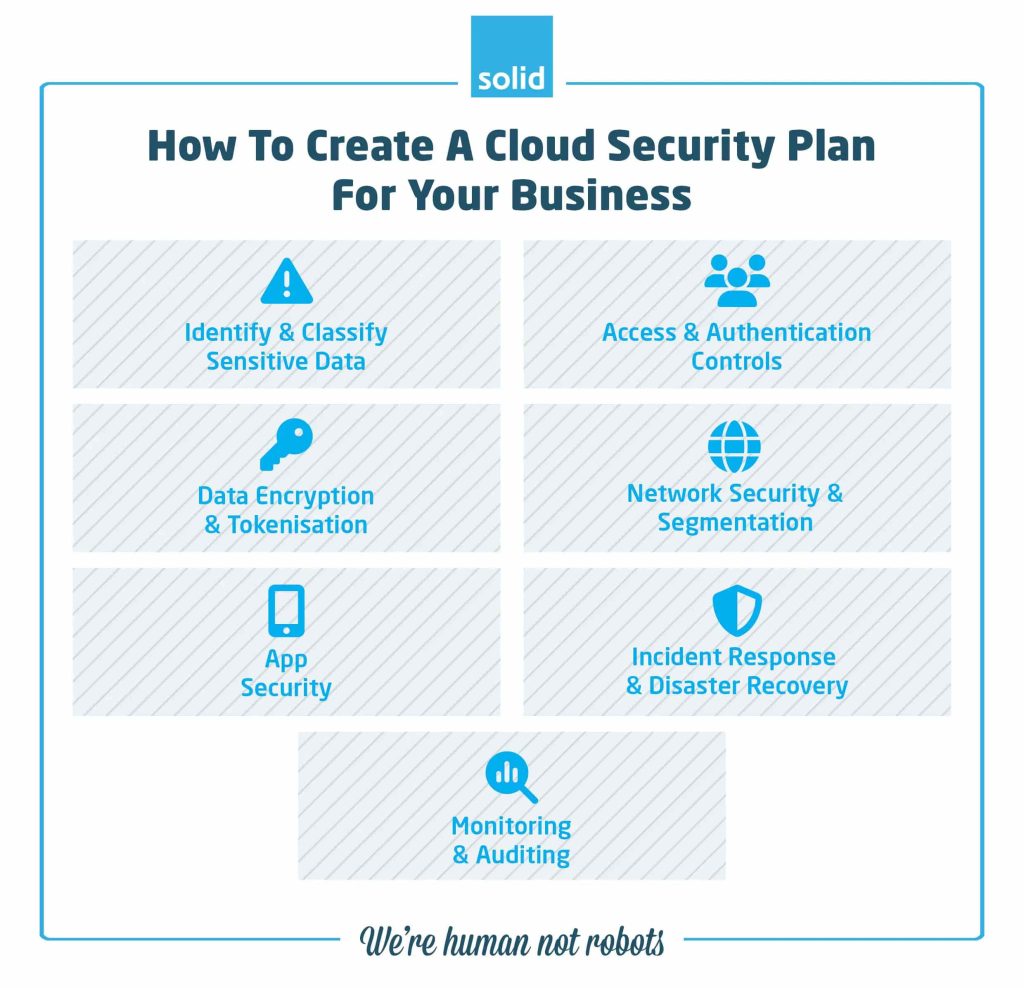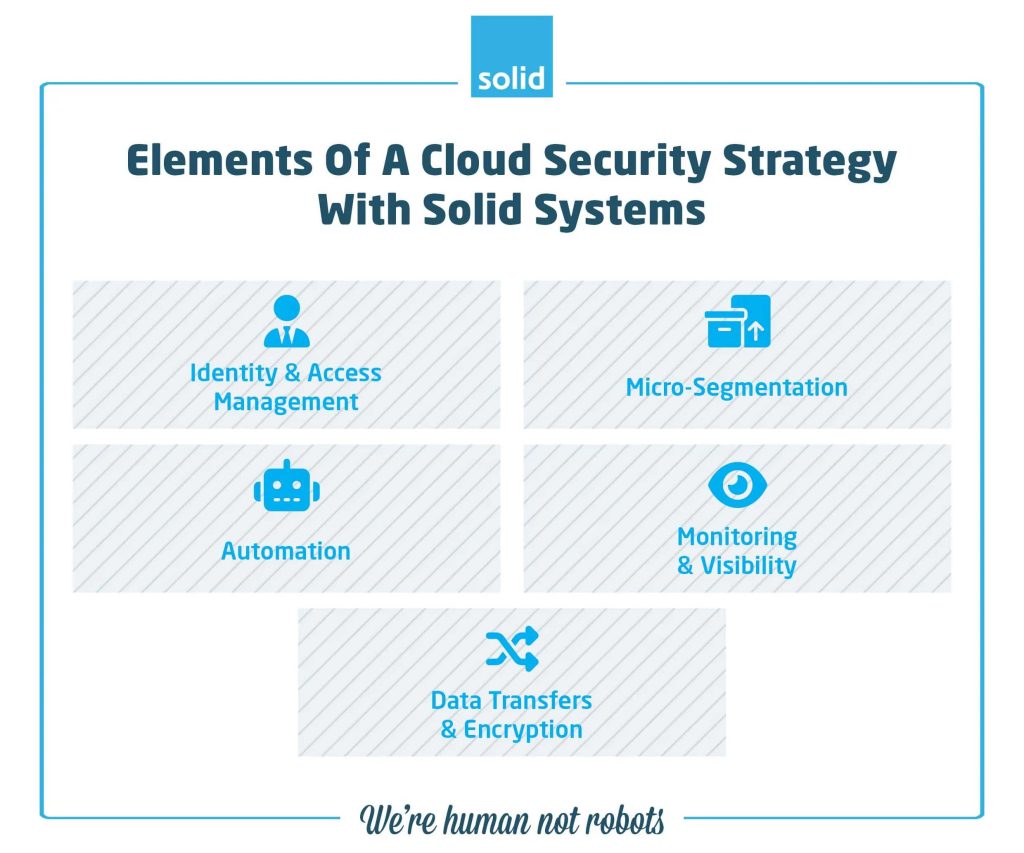
With the continuous growth and development of cloud technology, businesses are increasingly shifting their operations to the cloud. This shift brings numerous benefits such as flexibility, scalability, and cost-effectiveness. However, it also introduces new security challenges that must be addressed in order to protect sensitive data and maintain business operations.
In this article, we will discuss the importance of having a cloud security strategy, how to create one for your business, and the key elements that should be included in such a plan. We will also highlight the role of Solid Systems as a technology partner in helping businesses secure their cloud solutions against various threats.
The Importance Of Cloud Security Strategy
With more and more businesses storing sensitive and operation critical data in the cloud, it is essential for you to be keeping your cloud services as protected as possible. While cloud solutions do offer security in and of themselves (and their accessibility can even make them more secure than their on-premises counterparts), the increasing cybersecurity threats that businesses face make it essential for you to put a well-defined, robust and secure cloud strategy in place. Cyberattacks, and even data that becomes compromised due to natural disasters, can result in significant financial losses, damage to reputation, and legal consequences.
A solid cloud security strategy is crucial for businesses of all sizes, since it provides a comprehensive framework for identifying potential risks, implementing measures to mitigate those risks, and responding to any incidents that may occur. Having an in-depth strategy in place for dealing with threats can also help you to comply with various data protection regulations, like South Africa’s POPI Act and the EU’s GDPR.
How To Create A Cloud Security Plan For Your Business

As a business, keeping the information and apps that you’re using in the cloud secure requires a thorough understanding of your unique needs and potential vulnerabilities. Here are some key steps to consider when developing a cloud security strategy:
• Identify And Classify Sensitive Data
The first step is to identify and classify the data stored in your cloud solutions. This is crucial as different types of data may require different levels of security measures. For example, customer information or financial records will need higher levels of protection compared to internal memos, general business documents or archival information.
• Access And Authentication Controls
Controlling access to your cloud services is critical in preventing unauthorised parties from compromising sensitive data. And by unauthorised parties, we’re not just referring to cybercriminals – mitigating internal threats and reducing the risk of human error can also play a huge role in protecting your data. Using security methods like Multi-Factor Authentication (MFA), and implementing role-based access control are vital components of a robust cloud security strategy. Partnering with a trusted technology provider like Solid Systems can ensure that your Identity and Access Management (IAM) solutions are both up-to-date and continuously monitored for suspicious activity.
Want to learn more about MFA? Check out our downloadable infographic.
• Data Encryption And Tokenisation
Encrypting data stored in the cloud is essential in protecting its confidentiality. Encryption involves converting information into code, which adds a layer of protection which is critical, particularly when it comes to sensitive information. While encrypted data can still become compromised during an attack, it will remain unreadable to anyone who doesn’t have the decryption key, reducing the risk of the sensitive information being leaked or exposed.
In a similar way, tokenisation can also protect data by replacing sensitive information with unique identifiers, rather than storing the details themselves. This helps reduce the risk of data breaches and minimises the potential impact if one were to occur.
• Network Security And Segmentation
With hybrid and multi-cloud environments becoming increasingly popular, data is being spread across different providers and apps, which can make it difficult to keep track of which information is being accessed by which platform. Throw in the fact that Shadow IT is on the rise – a practice where your humans are finding solutions that help them to do their work more effectively, but without you knowing which apps they are using – and it’s easy to understand why network security is rising in importance. This makes securing your network with a hybrid cloud strategy a crucial consideration for any business
It has become essential to have proper visibility and control over your network traffic. Implementing measures like firewalls, intrusion detection and prevention systems can reduce the risk of unauthorised access to your network. And setting up a Cloud Access Security Broker (CASB) can help you to maintain visibility on which apps are accessing your data, and limit their access to critical or sensitive information.
Segmentation is another network secure technique that plays a vital role in limiting the impact of potential breaches. By dividing your network into smaller sections, you can limit the exposure of sensitive data and minimise the potential damage if one area is compromised. This also allows for easier monitoring and management of network traffic, as well as providing a layered approach to security.
• App Security
With more business adopting cloud-based apps than ever before, securing them has become a top priority. I’ve already mentioned the risk that Shadow IT adds to your network security, and it’s important to ensure that you know which apps are being used by each of your teams, and that they are as secure as possible. Some potential security measures that you could implement include putting proper access controls, like IAM solutions, in place to manage which of your humans have access to the apps you use, and which data the apps can access.
The data encryption that I mentioned earlier is also critical when it comes to app security. Even if a breach occurs, encryption means that the information will be unreadable without the proper decryption key.
• Incident Response And Disaster Recovery
Despite all of your best efforts, you may still fall victim to a security breach. That’s why having an incident response and Disaster Recovery Plan in place is crucial for any cloud security strategy. This will ensure that you have the necessary procedures and protocols in place to effectively respond to and quickly recover from a potential attack or data breach.
• Monitoring And Auditing
In order to fully understand and assess the effectiveness of your cloud security strategy, it’s important to have proper monitoring and auditing processes in place. This involves regularly reviewing logs and reports from various security tools and services, as well as conducting regular vulnerability assessments and penetration testing.
Luckily, you don’t have to tackle this on your own. This is, once again, where having a reliable cybersecurity and technology management partner can be an invaluable asset. When you work with Solid Systems, for example, we don’t just implement technology and security solutions. We also manage and monitor them on your behalf, giving you the peace of mind that you need to work effectively and focus on furthering your business, while trusting that your security needs are being taken care of.
Elements Of A Cloud Security Strategy With Solid Systems

At Solid Systems, we understand the importance of having a comprehensive and robust cloud security strategy in place that meets your unique needs. That’s why we offer a wide range of services and solutions specifically tailored to help you secure your cloud environment. We work with you to provide a holistic approach to securing your cloud solutions and your business as a whole.
• Identity And Access Management
With the increasing number of employees working remotely and accessing sensitive information from various devices, it’s more important than ever to have strong IAM in place. Our team at Solid Systems can help you implement Multi-Factor Authentication, single sign-on, and other identity management solutions to ensure that the right people, and only the right people, within your business have access to the data and tools that they need to work effectively and efficiently.
• Micro-Segmentation
In a similar way to IAM, micro-segmentation allows for granular control over network traffic within your cloud environment, limiting access to specific resources and apps based on user roles and permissions. This helps reduce the attack surface and mitigate the risk of a potential breach. Our team can help you to implement a micro-segmentation strategy that prioritises the protection of your information, while still ensuring that the people who need to have access to specific tools and resources are able to access them with ease from wherever they may be in the world.
• Automation
Automation is key to maintaining a strong security posture in the ever-evolving world of cloud computing. By automating security processes such as patch management, vulnerability scans, and access controls, we can ensure that your cloud environment is constantly protected against new threats without disrupting your business operations.
• Monitoring and Visibility
Having visibility into your entire cloud environment is crucial for identifying potential security threats and risks. That’s why we offer continuous monitoring of your cloud environment to identify potential issues and responding to security incidents quickly, efficiently and effectively. Our team uses advanced monitoring tools and industry best practices to continuously monitor your infrastructure for any suspicious or malicious activities, giving you peace of mind that your data and infrastructure is secure.
• Data Transfers and Encryption
As more and more businesses move towards hybrid cloud solutions, the need for secure data transfers between different environments becomes increasingly important. And encryption plays a big role in data protection during those transfers. Our team can not only help you establish secure connections and give you access to world-class tools for transferring data between on-premise and cloud environments, but we also implement strong encryption protocols for both data at rest and in transit, giving you peace of mind knowing that your sensitive information is secure, no matter what.
Solid Systems: A Technology Partner You Can Trust
At Solid Systems, we understand the importance of a strong cloud security strategy and the role it plays in protecting your business’s sensitive information. We have spent the past two decades helping businesses to digitally transform their operations and take advantage of the best cloud solutions in the world. We have seen the impact that cloud services have on the way companies and humans work, but more than that, we understand how critical it is that those cloud solutions be secured against a wide range of threats.
Our focus as a company is not just in helping businesses to adopt the right technologies and manage them effectively. It’s in offering the peace of mind that comes with knowing that your data and your operations are as safe as possible. We want you to be able to focus on the core areas of your business without worrying about security protocols, data transfers and potential attacks. Let us take care of your cloud security while you take care of your business growth.
If this sounds like the kind of partnership that you need in your life, then don’t wait any longer. Schedule a free consult with our Sales team today, and let’s work with you to put an effective cloud security strategy in place that sees you embracing the right cloud services, while we keep them safe.
Frequently Asked Questions
A cloud security strategy is crucial as it safeguards your business from potential cyber threats and data breaches. It ensures the integrity and confidentiality of sensitive information, improving your overall security posture. Plus, a robust strategy help you to stay compliant with in regulations like South Africa’s POPI Act and the EU’s GDPR, builds customer trust, and allows for secure and uninterrupted business operations.
A cloud security strategy is a comprehensive plan that outlines how to protect data, apps, and infrastructure involved in a cloud computing environment. This approach incorporates multiple layers of controls, policies, and technologies to safeguard from cyber threats. It aims to maintain the confidentiality, integrity, and availability of your cloud resources. The perfect strategy will be unique to your business’s specific needs and help you meet regulatory requirements for optimal cloud security.
Implementing a cloud security strategy involves several critical steps:
- Understand your cloud environment
- Identify potential vulnerabilities
- Determine the appropriate security measures, such as identity and access management or encryption.
- Put together a plan of action for implementing security measures and addressing vulnerabilities
- Work with cybersecurity experts like Solid Systems to protect your cloud environments and put your plan into action.
There isn’t a one-size-fits-all solution when it comes to tools for implementing cloud security, as it largely depends on your specific needs. This is why it’s important to work with a technology management and cybersecurity partner like Solid Systems to design a cloud security strategy that best suits your business. We work with you to put together a strategic technology roadmap which includes a combination of advanced cybersecurity measures, from encryption and IAM solutions, to cloud security monitoring and Disaster Recovery Planning. Partnering with us helps you to create a hybrid cloud strategy that is secure, robust, and tailored to your business needs and goals.
Popular Searches
- Cloud Access Security Broker
- Cyber Security Facts
- Cloud Storage Security
- How To Prevent Phishing?
- Cyber Security Tips For Employees
- IT Infrastructure With Cloud Computing
- How To Ensure Data Integrity
- Hybrid IT
- Cyber Security Do's & Don'ts
- Advantages Of Cloud Storage
- Multi Factor Authentication
- POPI Compliance Audit
- Network Security





